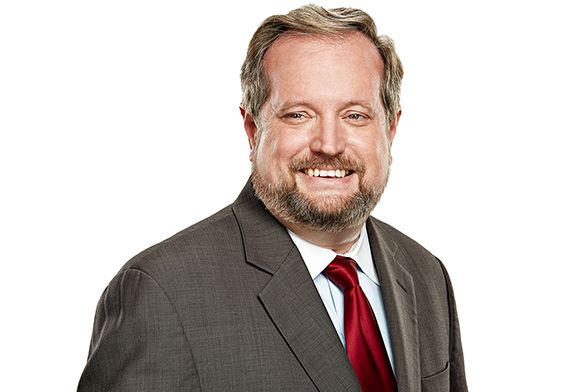Being at Work, Staying a Johnnie: Brett Heavner (A89)
October 26, 2020 | By Chris Liu (A22)

“Being at Work, Staying a Johnnie” is a job-shadowing column offered by the Career Services Office and written by Career Services student aide Chris Liu (A22).
As students at St. John’s College, we contemplate a wide range of academic topics and foundational ideas, from Ancient Greek to modern physics. Naturally, we also have diverse career interests. However, while we have the Great Books to navigate our academic passions, what real-life “books” can we turn to in order to understand more about career fields that interest us?
Our alumni, just like our reading list, can help guide us as we explore the enormous range of jobs and vocations that exist in today’s world. Many alumni were once in the same place that we find ourselves today, and they faced similar challenges in their career search. “Being at Work, Staying a Johnnie” is meant to help St. John’s students learn about the many different careers that graduates pursue. In each article, I will ask alumni to share their perspectives and advice, with the goal of providing illumination and clarity for interested Johnnies.

My first interviewee, Brett Heavner (A89), is currently a partner at Finnegan, Henderson, Farabow, Garrett, & Dunner LLP, a full-service IP law firm in Washington, DC. His practice includes all aspects of trademark and unfair competition law, with a particular emphasis on trademark infringement, counterfeiting, false advertising litigation, and Trademark Trial and Appeal Board (TTAB) litigation.
Chris Liu: How would you describe what you do?
Brett Heavner: I’m with a law firm that specializes in intellectual property, patents, trademarks and copyrights, and trade secrets. A trademark is a name or a logo that a company uses to identify itself, its products, and services. And a copyright protects a work of authorship (like a novel, a painting, a piece of music, or even software code). I work with companies that want to protect their trademarks and copyrights. I help them select trademarks, and then register them with the U.S. Patent and Trademark Office or with government trademark offices in other countries. I also help them if they come across counterfeit products to enforce their rights against those who are manufacturing and selling the counterfeits.
Intellectual property is a very specific field of law. Were you interested in this when you were in law school?
It’s kind of funny because I actually did not even take any courses in law school for intellectual property at all. I went to Duke University for law school, and I got an advanced LLM (Master of Laws) degree in international trade law. I was also part of an international trade summer study program at the University of Copenhagen. My first job with a law firm after I graduated from law school focused on international trade. But I found that the particular international trade practice at that firm was not as exciting as I thought it was going to be. That law firm mainly focused on two different kinds of international trade: antidumping and countervailing duty disputes. The first type is when a U.S. company accuses a foreign company of selling their product in the U.S. marketplace at less than fair value, meaning that they’re trying to harm the U.S. consumers and manufacturers in a competing product. So when the U.S. manufacturers go out of business, then of course, the foreign company can raise their prices or do whatever they want. Similarly, countervailing duty cases arise when a foreign manufacturer has a subsidy or tax break from their home country’s government, making it cheaper for them to operate than it would be for the U.S. competitors. The remedy for the U.S. companies who are being injured by such unfair trade is to file a complaint with the U.S. Court of International Trade seeking an additional tax on the imported products so that the foreign company wouldn’t have an unfair advantage.
In reality, I just found that sort of work to be quite dull. It was more like accounting work and not as creative as I was hoping international trade would be. So I started working with a partner who specialized in trademark and copyright law. I found that I really, really liked the trademark and copyright work. After a few years I moved on to my current law firm, whose practice focuses solely on intellectual property law.
It sounds like the different fields in law are quite interchangeable. Was it hard to switch from international trade to intellectual property?
I wouldn’t say it was hard, but they are vastly different areas of the law. When you get a JD at a law school, most of the time, you haven’t really specialized in a particular area of the law. You can try to take more classes in the area that you think you’re going to be interested in, but what I would say is that you never really know what you are going to love until you start actually doing it. I ended up doing something that I never even thought about, and I found that I really, really loved it.
I think one of the great things about St. John’s is that we learn to learn, and we learn to not be afraid to tackle unfamiliar problems. You can do that with a legal career. So even though I had never taken any classes in trademarks or copyrights during law school, my St. John’s background made me inquisitive and able to analyze different topics to learn new things. I just tackled it and found that I could do it. It’s not so much that different types of law are interchangeable, it’s that you have opportunities to try different fields of law after you graduate from law school.
What is the most challenging part of your job?
The biggest challenge is providing the client with both an accurate legal analysis and practical business advice at the same time. For example, you represent a company that wants to use a new logo that they have just designed, but you find out that someone else has a very similar logo in a slightly different field. Then you must analyze the situation and help your clients assess the risk if they should go forward with the new logo. You know the answer that the client wants to hear, but you also want to give them an accurate understanding of how a court or the U.S. Patent and Trademark Office might view the situation. I think it is challenging to give someone good advice while looking at all the different angles of the potential dispute that they might face. But it is also kind of enjoyable, because it can be fun to come up with innovative strategies and creative arguments to help them do what they want to do.
How did your St. John’s experience help you or inspire you to apply for law school?
I think that the St. John’s education is a great pre-law program because it gives students experience with logic and critical thinking. One aspect of being a lawyer is that you first learn the legal rule, and then you use critical thinking to apply that rule to different scenarios that your clients have brought to you. That seems like a lot of what we were doing in the math tutorials. You first learn principal mathematical rules that you base your logical thinking on, like Euclid’s definitions and postulates, and then you start building your mathematical universe by applying those to the facts that you’re presented with. That is very similar to what you do in law school.
What advice would you give Johnnies who are interested in a legal career?
The practical advice, I would say, is to take a LSAT prep course, because I think that actually is very helpful. Another bit of advice is to work on your writing. From watching television, a lot of people believe that lawyers are in court every day and they spend most of their time public speaking. But really, the vast majority of what I do is writing briefs, writing letters, and writing opinions.
As for the theoretical advice, I think one of the things that might help someone decide whether they are suitable for law school is thinking about the governmental and political type of readings that we have in seminars. Because in some respects, law is an idealized belief of what justice should be. Spending more time on books such as the Nicomachean Ethics or authors such as Locke, Rousseau, and Montesquieu is very helpful in understanding these idealized government structures.
Is there anything else you want to add to this interview?
It’s kind of funny that when you’re going to law school, most students have preconceived notions of what they think practicing a particular type of law would be like. In my case, I thought international trade would involve bridging cultural gaps and diplomacy style negotiations. But that was not the case in my first job. Similarly, I thought intellectual property was solely for engineers and computer experts. While that may be true for patents, I found it was not necessarily true for trademarks and copyrights. Oftentimes, different legal specialties are completely different from what you expected. I think if you’re ever interested in law, keeping an open mind as to which specialty you want to do is important.
Starting in October, I will feature a specific career field each month. If there is a particular field that you would like to explore or any specific questions that you would like to be included in the interview, please do get in contact with me, Chris Liu.

